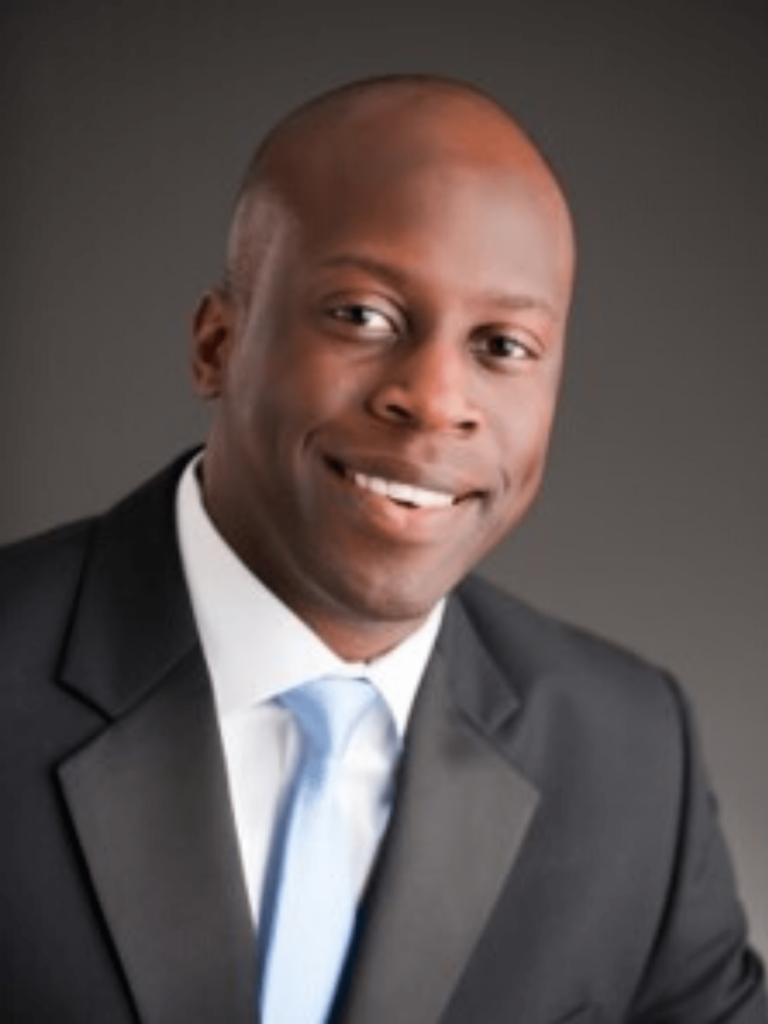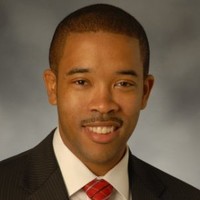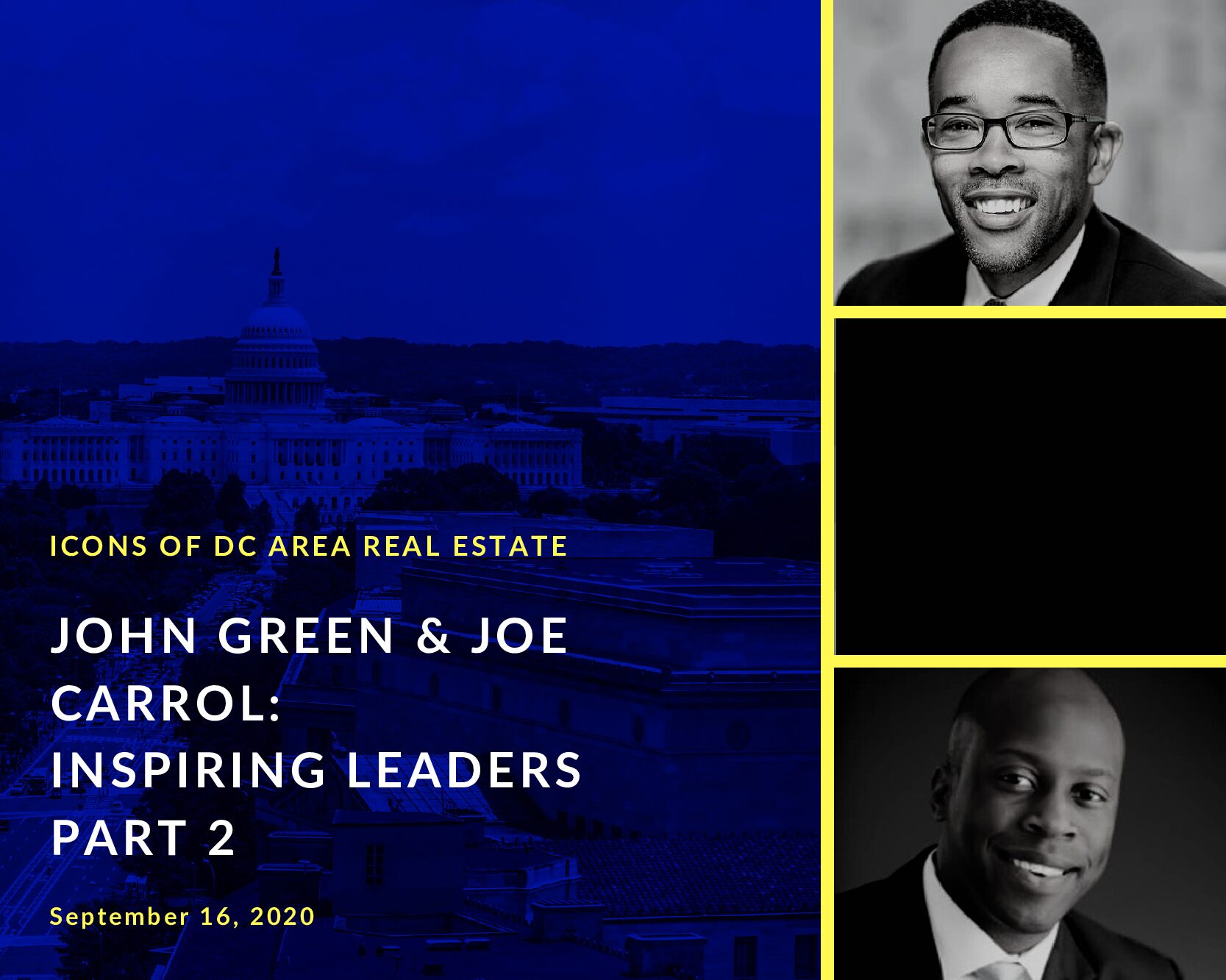


Following up on Part 1 with John Green and Joe Carrol, I probed into the ongoing social issues in America today with race relations and a particular focus on the real estate industry. John Green and Joe Carrol were forthcoming about the disparities that exist between Black and White people regarding the wealth gap and the percentage of participation in Senior leadership in our industry. From there they offered suggestions both systemically to be more aware of the “unconscious” racism that many of us have and individually to tactics to promote equality and courage among Black young professionals to pursue opportunities. This was a very compelling conversation on many levels. Hope you enjoy!
Bios
Social Issues
Joe Carrol
- Uses “planting seeds” analogy for improving the social condition (4:00)
- Life, Liberty, Pursuit of Happiness
- Killings of blacks by Police are now becoming important
- Actions in the short term are not “long term” in their impact and “don’t get it done”
- The need for “long term” impact is important to consider
John Green
- Seeds planting with children to provide security, love and understanding (8:00)
- Long arc of perspectives about race (9:15)
- Hopeful that activities of the moment can be long lasting (9:30)
- Nation has a short attention span
- Complex and nuanced issues that need a longer view (10:15)
- Wealth gap is significant (10:30)
- Compounding interest for multi-generational wealth
- Whites have a 17X net worth over median Black families (11:00)
- Real Estate has a unique opportunity to make an impact on this difference (11:45)
- Median family in US has 2/3 of their wealth in their home (12:15)
- Acknowledge that Minority families are underrepresented in ownership and wealth potential (13:00)
- Senior Exec. Leadership in Real Estate have only 2% Black leadership (13:50)
Joe Carrol
- Real Estate is a “pure market” business and become insulated from social awareness (14:30)
- Story about “No people living on Capitol Hill” discounting the Black population- gentrification (15:30)
- Distorted mindset about the population
- Should individuals have a role in the gentrification? (17:15)
- Governments accelerated the process
- Copout for Real Estate Industry (18:30)
- Wants to play his part to change the mindset (19:00)
John Green
- Meritocracy (19:30)
- Tom Schelling– Game Theory (20:15)
- Epiphany in his work- Don’t need large numbers to cause a major transition in neighborhoods or workforces (21:15)
- Quintessential relationship business (21:45)
- EEOC Study- 96% of people leading Real Estate teams in DC are White (23:00)
- Other industries average about 65% White in senior leadership (23:30)
- Acknowledge that small biases identify racism (25:00)
Joe Carrol
- Step outside of usual network and “do the work” to bring in a “different” perspective (25:50)
- Networks affect our business significantly (27:00)
- Difficult to find large pool of “Black talent” (28:00)
John Green
- Want a dynamic person (“best athlete”)- Not necessarily trained in RE (28:50)
- Analogy of GS analyst class- varied and divergent backgrounds that were effective (29:30)
- Yet, CRE is not as divergent in its choosing talent (30:10)
- Reality is that “roles are aggressively protected in CRE” (30:40)
- Analogy to “longshoreman” are protected (31:00)
- Multigenerational wealth and network in real estate (old boy network) (31:15)
Joe Carrol
- Response to my question about **Urban Plan** and Project REAP (33:00)
- Project REAP is particularly effective (34:00)
- Cites Lowe Enterprises’ “taking a chance” on Joe as a Black executive (35:20)
- Question always rises about Black candidates: “Are they familiar with numbers?” (36:00)
- Whites not necessarily asked to “run numbers” (37:30)
John Green
- Industry is unique and exposure at multiple levels (38:40)
- Give exposure as early as HS (39:15)
- Several programs cited (39:40)
- Foundational skills important (40:00)
- Universities and Real Estate Affinity Groups can focus on diversity in the industry (40:45)
- Non Profit industry- Example- Community Builders (41:00)
- More complicated capital stack (41:50)
- More difficult to assemble deals
- More attrition and turnover
- Good place to identify talent
- Presumption that a Black professional should understand LIHTC program with experience elsewhere, even though that person did not have that expertise (43:00)
- Notion to have influence in the industry (46:30)
Mentorship
Joe Carrol
- Case- Young black mentee who interviews with a broker who asked “What are your long term plans?” He responds with “Eventually own real estate” and broker says we want someone interested in “What can you do for me today?” (48:30)
- Encourage his mentee to meet with competitors (50:30)
- Plan for a Black young man or woman coming in business
- First year- Keep your head down and work 12 hour days (capable)
- Second year- Network internally at the company to learn about what everyone in the organization (affable)
- Third year- Get to know as many people in the industry (social)
John Green
- Extend oneself differently (54:45)
- Network in organizations (55:30)
- “Form an opinion” about perspectives and make sure people understand it (56:20)
- Be proactive about your opinion
- Find ways to assert ideas and recognize that “your opinion matters” (57:30)
- People are willing to join for coffee or meals (58:50)
- Mastermind Groups- 4-6 people that meet together periodically
Life/Career Lessons
Joe Carrol
- Biggest Win- CityVista project during the Global Financial Crisis in 2008, the project sold over 350 condo units, leased and sold the retail component and leased the apartments (1:01:00)
- Biggest Loss- When a capital partner walks away and misunderstanding the character of partner (1:02:40)
- Most Surprising- Mentor at Lowe Enterprises was a 60+ yr. old white man (Bob Weekly) from Texas who taught Joe so many things for 4-5 yrs.-Realized he was his Mentor after he died and even just before he died told Joe that he was a great person (1:04:00)
John Green
- Biggest Win, Loss and Surprising Event were actually combined in the hiring at MacFarlane Partners it was a Win, but when the market turned it became the Loss as it became a different type of role and job doing workouts (See Part 1 descriptions for more details) (1:07:00)
- When everything looked bleak, he asked an investor to step up and make a supplemental investment and was asked by Victor MacFarlane and was asked if he was willing to bet his career on his idea…and it turned out well in the long run (1:10:00)
Joe Carrol
- Answer to Billboard question: “Give” (1:11:30)
Postscript
- Tom Amos to reflect on discussion with John Coe (1:12:30)
- John’s work regarding deed in lieu of foreclosure and forfeiture (1:13:00)
- Evicted by Matthew Desmond
- Rent Cafe- Ranking system for states regarding renter friendly
- Vermont most renter friendly
- DC was #8
- Landlord friendly- States in the South and Midwest
- Alludes to Joe Carrol’s statement about “No one living on Capital Hill”
- Three largest publicly traded real estate firms only 3% were in senior leadership positions
- Joe’s suggestion for searching for minority talent
- Isn’t necessarily conscious “racism” more unconscious racism
- Need to be aware and conscious about the race issue
- Not a deep pool of qualified applicants in the minority community for our industry
- Awareness issue
- Joe’s proactive approach to his three step approach
- Work very hard first year
- Network internally second year
- Network outside your company the third year- build courage
- Older people love when young people reach out

